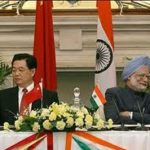 Two articles in the Wall Street Journal this week contain thoughts bearing on the debate regarding the relative virtues of China’s authoritarianism and India’s free-wheeling, cacophonous democratic system.
Two articles in the Wall Street Journal this week contain thoughts bearing on the debate regarding the relative virtues of China’s authoritarianism and India’s free-wheeling, cacophonous democratic system.
Countless paeans have been written about the triumphs of centralized, technocratic pragmatism in Beijing. The closed-door, brutally efficient decision-making may not be all that great in terms of human rights and civil liberties, but business executives and pundits around the world marvel at the policy outcomes it has delivered: Three decades of blistering economic growth; rapid industrialization and urbanization that has utterly transformed what was not too long ago an agrarian society; and an epochal shift in the global balance of power.
China’s success has feed the notion that there is something of a Faustian bargain between economic prosperity and democratic governance. This view was especially prominent in the “Asian values” debate of the mid-1990s (here and here) but it persists in the conventional wisdom that India’s messy democracy is a hindrance to the country’s efforts to catch up with China. Some years ago, New York Times columnist Nicholas Kristof opined that due to political disorder Indian “economic policy-making isn’t nearly as shrewd, pro-growth or farsighted as China’s.” More recently, Charlie Munger, Warren Buffett’s long-time business partner, averred that while the Chinese government “can get things done,” the Indian system is mired in “paralysis.”
In view of China’s awe-inspiring performance, it is thus easy to dismiss the profusion of wild rumors that came out of Beijing in recent days. But their proliferation – driven largely by a system of governance explicitly designed to frustrate inquiry by citizens and media alike – indicates that high-level political strife of some kind is occurring behind closely-guarded scenes. Even the Global Times, a fiery tabloid affiliated with the Communist Party, complained of the information void and the corrosive effect on public morale. Given that few know exactly what is happening, a Journal editorial concludes that the regime is not as stable as many believe.
Contrast the situation in New Delhi. It is painfully true that Indian policymaking garners no accolades for efficiency, managerial competence or sagacity. The distinguished technocrat currently sitting atop the central government is in control of neither his own Cabinet nor his party. Important policy decisions – like retail sector liberalization and the creation of a national counter-terrorism center – are rolled out in haphazard fashion, only to be embarrassingly retracted when opposition forms. Political paralysis means that much-needed economic reforms remain stillborn, while populist social spending continues to pile up ruinous fiscal deficits.
The results are plain for all to see: A persistently underperforming economy that despite its vast potential has failed to match China’s explosive pace; dilapidated infrastructure that has kept global supply chains at bay and is woefully ill-prepared for the coming wave of urbanization; shameful socio-economic conditions that rival those in the poorest areas of Africa.
Yet for all of Delhi’s manifold dysfunctions, investors at least need not worry about the very stability of the political system. Nor, too, that skullduggery in the corridors of power will remain cloaked. India is a place highly resistant to the keeping of secrets. The constant backstabbing and logrolling in the Indian capital is all conducted in public view.
A piece by Joseph Sternberg, editor of the Journal’s “Business Asia” column, drives home this point. The budget laid before the Indian parliament last week by Finance Minister Pranab Mukherjee has been excoriated on several counts, not least for the proposed retrogressive tax on capital gains arising from overseas purchases of Indian assets. New Delhi had earlier attempted to levy a $2.2 billion tax charge on Vodafone’s purchase in 2007 – via subsidiaries registered in the Cayman Islands – of controlling interest in an Indian mobile phone operator owned by Hong Kong’s Hutchison Whampoa conglomerate. But after an extensive legal battle, the Indian Supreme Court recently reproached the government for overreaching its authority.
Having failed to prevail in the courts, the government is now attempting to rewrite the law. Critics charge that the tax proposal will further contribute to the country’s growing reputation as an inhospitable investment destination. Sternberg agrees with this view but also points to a silver lining: The tax plan is at least “a victory for rule of law. Delhi’s politicians are being forced to impose through an open legislative process a bad policy idea they previously sought to implement on the sly via bureaucratic diktat.”
Beijing is reportedly mulling important changes in its investment policies and Sternberg argues that the comparison with New Delhi is instructive: “Good luck figuring out how [Chinese] rules will change…. If Beijing stays true to form, such questions will eventually be answered with a vague-ish new regulation released with minimal public consultation…”
He concludes:
“Indian democracy too often gets a bad rap for being bad for business. Not at all. Dumb Indian policies are bad for business. Indian democracy is good for alerting businesses and investors to where the dangers lie – and giving the public a chance to demand better at any time voters choose to do so. As a result of the debate over this retrogressive taxation proposal, businesses will have a clear signal about who their friends in Delhi are, and how welcome foreign participation is. Investors in China should be so lucky.”
India is constantly benchmarking itself vis-à-vis China, usually to its disappointment. But this week highlighted fundamental indicators where it comes out ahead.